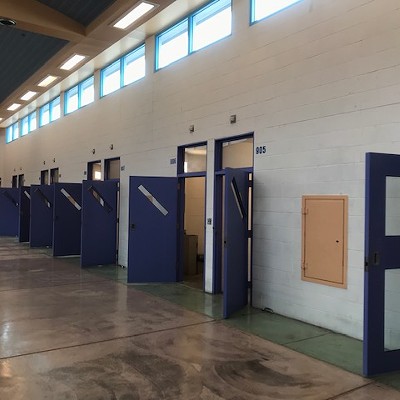CROSSING THE PARTY
Ward 6 City Councilman Steve Kozachik is crossing party lines to join the steering committee for Democrat Ron Barber, who announced last week that he'd run to complete the congressional term of Gabrielle Giffords. (See "That's the Ticket" to your left.)
Kozachik said that Barber, who has been the district director for Giffords since she took office in 2007, has been leading the Congressional District 8 staff's solid constituent work since Giffords was shot.
"They're the ones who know the issues in the district," said Kozachik, who figured that if a Republican wins the district, "the very first thing he would do is fire all of staff and put his own in, and then simultaneously turn around and start to run for the November election. Who's lost in this whole conversation? The constituents of District 8. Simply on the basis of what's right for the community ... let the people who have been doing the work continue to do the work until the regular election."
Kozachik, who also crossed party lines to support Democrat Richard Carmona in his Senate run this year, said he's getting blowback from Republicans. Conservative radio-host Jon Justice bounced Kozachik from a weekly chat on the show, saying he'd need to have representatives from all the campaigns on his morning outrage-athon if he continued the segment with Steve K.
"I've got people calling me a Demo-Rat," Kozachik said.
TYRANNY OF THE MINORITY
Pima County is pushing back against HB 2656, a bill that would give suburbs around Tucson veto power over future bond projects.
Pima County Bond Advisory Committee chairman Larry Hecker led a press conference last week that brought together a diverse group of folks, ranging from homebuilder Chris Sheafe to advocate-for-the-homeless Brian Flagg, to denounce the pending legislation.
"I'm not sure that this is so much about the workings of the bond committee as it is about vendettas and disputes that otherwise occupy the workings of our local politicians—namely, the Pima County-versus-Marana conflict that seems to be never-ending," Hecker said.
But Southern Arizona Republicans who support the legislation say that Pima County is using too many voter-approved bonds for non-voter-approved projects, and is generally misspending bond money.
Rep. Terri Proud said she drafted the legislation, with the help of the city of Marana, because county Administrator Chuck Huckelberry abusively wields power over property-tax-paying county residents, and uses corrupt bait-and-switch tactics to reallocate bond money. Besides that, she argued, Pima County already has the highest bond debt in the state, and not much to show for it.
"Most of the bonding is all about parks," she said. "We spent $1.5 billion, and that's what we get—some freaking cactus. ... For $1.5 billion, we should have Pima County looking like the god-dang Wizard of Oz, like the Ritz Hotel."
HB 2656 passed the Technology and Infrastructure Committee on a party-line vote and now heads to a vote by the full House. The bill would create a six-member Regional Bond Accountability Committee, which would need to OK any new Pima County bonding, or changes to bond spending. The committee would be made up of one member each from South Tucson, Sahuarita, Oro Valley, Marana, Tucson and Pima County. It would take three members to veto any new bonds or make changes to bonds.
Bonds are used for all sorts of public-improvement projects, including new roads, traffic and road-safety improvements, parks and hiking trails, libraries, law-enforcement communications equipment, bridges, new government buildings and repairs to buildings.
Huckelberry said the county already goes through an extensive public-input process and a vote by the Board of Supervisors before issuing new bonds or, in rare circumstances, changing spending plans on approved bond projects.
"It's an absolute fantasy, and it never happens," he said of Proud's claim that the county has spent bonding money on unrelated projects.
"There is a process for modification, but that happens very, very rarely, and then only with a good, specific reason, and then only after public-input opportunities, usually by three different government bodies. It's one of the myths, I guess. It's a great legend, but it's not true."
He said that more than two-thirds of the bond projects from the last two cycles have been completed on schedule—95 percent of those without changes to the plans.
Huckelberry is rallying a wide spectrum of community support against the bill, including the DM50, the group that works to ensure that Davis-Monthan Air Force Base remains open.
Thomas Murphy, president of the DM50, wrote to members of the House of Representatives to let them know that Pima County's bond program "has been and continues to be an absolutely necessary and critical component of base preservation."
"HB 2656 proposes an inequitable balance of power and an inappropriate delegation of authority from a local elected body to an appointed commission," Murphy added.
Democrat Bruce Wheeler of midtown Tucson voted against the bill in committee, saying he didn't like the idea of three appointed people having the power to kill bonding for the whole county.
"To me, this is an attempt to try to remedy a problem by creating another set of problems," he said. "It is another layer of people involved. It could be controlled by a tiny number of unelected extremists who could kill any progress in our community."
GUNS, WEED AND OTHER SCHOOL BULL(BLEEP)
A quick roundup of some of the other bills we're following:
• Lawmakers moved one step closer to allowing guns on university and community college campuses when, after more than two hours of testimony with more than 100 people signed in against the bill, the Senate Judiciary Committee approved SB 1474, which would allow concealed-weapons-permit holders to bring their guns to class.
• Lawmakers aren't so down with bringing pot to class, though. HB 2349, which would prohibit medical-marijuana-card holders from possessing cannabis on campus, cleared both the House Education and Higher Education committees and is now off to the full House
• HB 2675, which requires every student to pay at least $2,000 toward their college education every year, was scheduled for a committee vote on Wednesday, Feb. 15.
That $2,000 couldn't be paid by any other source of public or private funding, including grants, gifts, scholarships or tuition benefits. Student athletes and students with full-ride academic scholarships would be exempted, but everyone else—even returning vets using the GI Bill to go back to school—would have to shell out at least $1,000 per semester.
• Anything that you can't say on TV, you can't say in the classroom. That's the idea behind SB 1467, which would force public schools to suspend or fire, on a three-strikes system, any teacher who uses language that would get bleeped on TV. The bill would apply to universities and colleges as well as K-12, and would bring up questions about how to teach books like Catcher in the Rye due to the language.















